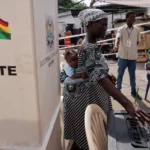Some civil society organisations (CSOs) and individuals have opposed the National Assembly’s move to amend the constitution to allow married girls under 18 years of age to be eligible to vote. Nigeria’s constitution currently pegs voting age at 18.
The National Assembly Joint Committee on the Independent National Electoral Commission (INEC) recommended that married girls under 18 be recognised as eligible voters.
The joint committee made the recommendation to a technical committee which will work on the new electoral act proposed by the federal lawmakers.
The technical committee is made up of lawyers, lawmakers, INEC officials and CSOs. At a public hearing organised by the joint panel a fortnight ago, some stakeholders recommended that married underage girls should be considered as voters.
Speaking at the event, the Chairman, Senate Committee on INEC, Senator Kabiru Gaya (APC, Kano) said the recommendation was a unanimous decision by the joint panel.
“The joint committee has proposed that if a lady who is not up to 18 years is married, she should be considered to be mature enough and be eligible to vote,” Gaya said.
But INEC Chairman Prof. Mahmood Yakubu said the issue of voting age is a constitutional matter, as the law also recognises 18 as marriageable age.
Reacting to the development, a business mogul, Atedo Peterside, opposed the federal lawmakers’ proposal.
Peterside said on his Twitter handle, “Very soon, paedophiles too will tell us that their under-age victims must have voting rights?”
On his part, the Executive Director, Civil Society Legislative Advocacy Centre (CISLAC), Auwal Musa Rafsanjani, told Daily Trust that he faulted the lawmakers’ plan.
“We should encourage girls to go to school and not to encourage early marriage that is a disadvantage to girls. We should not be encouraging pulling out children from schools for marriage. So, because of that, I do not subscribe to that amendment,” he said.
Also, the spokesman of the Coalition of United Political Parties (CUPP), Chukwudi Ezeobika, rejected the lawmakers’ recommendation, saying it was against the letters and spirit of the Nigerian Constitution and the Electoral Act 2010 particularly Section 12 (b) which provides the minimum age for eligibility to vote as 18 years.

 Join Daily Trust WhatsApp Community For Quick Access To News and Happenings Around You.
Join Daily Trust WhatsApp Community For Quick Access To News and Happenings Around You.


